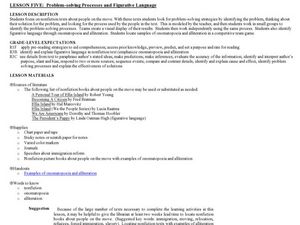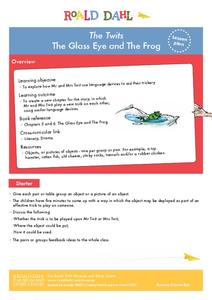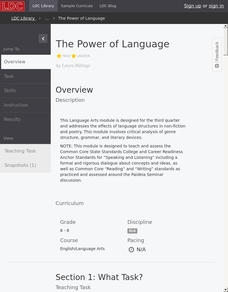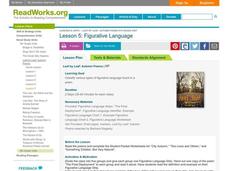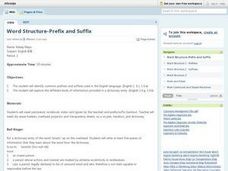Curated OER
Problem-Solving Processes and Figurative Language
Nonfiction texts about people on the move provide young readers with an opportunity to examine not only the problem-solving strategies employed by immigrants, but to also find examples of figurative language these writers use to tell...
Curated OER
Inglés Básico: Food
Are your English language learners reviewing basic food vocabulary? Use this interactive webpage to let them work independently and at their own pace. Common food vocabulary is covered like breakfast, lunch, dinner, customer, meal,...
Curated OER
Long Vowel Sounds (e)
Many words in the English language use the long e sound. Learners will match the words leaf, meal, feet, deer, team, and peel to their correct illustration. They practice reading and printing the word before illustrating a combination of...
Curated OER
English in Mind Unit 12 Grammar Practice
In this English grammar worksheet, students identify the correct order for a conversation, answer questions in complete sentences, and practice using in/on/at. There are twenty four fill in the blank and short answer questions.
Curated OER
Charles Darwin Meets John Paul II
If you teach AP English language and composition and are looking for a way to address the differences between written and spoken arguments, consider this lesson. Over the course of three days, class members research Charles Darwin or...
EngageNY
Analyzing Point of View and Figurative Language: Chapter 1
Check out the view! Scholars complete a graphic organizer to analyze how Laurence Yep develops a character's point of view in Dragonwings. Additionally, pupils re-read parts of the novel and annotate the text on sticky notes, looking for...
EngageNY
End of Unit Assessment: Finding Evidence of Laurence Yep’s Perspective on Being Chinese in Dragonwings and Determining Connotative Language
There's a fine line between reality and fiction. As an end-of-unit assessment, scholars complete worksheets to analyze how Laurence Yep's perspective on being Chinese factors into his novel Dragonwings. Next, pupils engage in a...
Curated OER
The Sound of…Poetry!
Scritch, scratch, scritch. It's the sound of pupils writing poetry! Focus on sensory language and onomatopoeia with a writing lesson. After listening to some sounds, learners examine a couple of poems that include sound words and then...
Roald Dahl
Matilda - Miss Honey and The Trunchbull
As the instructor reads aloud several quotes from five chapters of the story Matilda, class members mime their interpretation of the scenes. Then, after reading "Miss Honey" and "The Trenchbull" (chapters seven and eight), the...
Roald Dahl
The Twits - The Glass Eye and the Frog
What do a pair of stinky socks and a toy hamster have in common? The third lesson in an 11-part unit designed to accompany The Twits by Roald Dahl uses silly objects to teach about figurative language. Zany pranks and role play make...
Curated OER
Figurative Language: Part Two
Help your young writers make their writing more descriptive and exciting in this figurative language lesson plan. Middle schoolers review their figurative language examples from Part One (linked to this lesson plan), and then write a...
Read Works
The Language of Setting
Descriptive language can be used to create a vivid and imaginative setting. Create the chart suggested in this plan to track the descriptive language found in The Wizard of Oz by L. Frank Baum. The class discusses the land beyond...
August House
Anansi and the Pot of Beans
Anansi is a tricky character, but can he realize he's wrong and write an apology letter? Learners use Anansi and the Pot of Beans to practice writing, art, and figurative language. A series of activities are engaging for both...
Literacy Design Collaborative
The Power of Language
There is power in words. Readers take a close look at three text to determine how language structures affect meaning, including include poems and recipes. Scholars analyze the language authors use by circling important words, underlining...
Read Works
Figurative Language
Do your learners need to practice identifying figurative language? This instructional activity outlines a method for working on that tricky skill. After teacher modeling and think-aloud, fourth and fifth graders identify examples of...
Curated OER
English Lesson Plans for Grade 7
Discuss the correct use of certain phrases such as "managed" and "could" in this English lesson. Middle schoolers listen to interviews on work customs in different countries and compare them. They make inferences after reading given...
Read Works
The Language of Setting
Examine the connection between descriptive language and emotional impact. For the first few chapters of The Lion, the Witch and the Wardrobe by C.S. Lewis, learners record the descriptive writing the author used to vivify the...
Curated OER
Resource Language Arts
Give your resource class an overview of grammar. While these slides are not complicated, they are nonetheless geared toward middle and high-school learners, who understand some academic language. The presentation ends with a list of...
PBS
Symbolism and the Use of “New Language” in The Handmaid’s Tale
Words matter. Words frame thought. Words are symbolic. Readers of Margaret Atwood's The Handmaid's Tale examine how the words In Gilead's "New Language" reinforce the power of the government and provided insight into the symbolic level...
Curated OER
Matthew Henson
Discuss the work of Matthew Henson, an African American who traveled to the North Pole with Robert Peary. After reading the story "Matthew Henson" by Maryann N. Weidt, learners answer questions by drawing inferences and conclusions,...
Curated OER
Mythological Word Origins
Review myths and the characters therein, connecting them to vocabulary words in the English language today. Begin by searching online for myths and character names. With at least ten names that are familiar English words, students use...
Curated OER
Mythological Word Origins
No wonder the ship was called the Titanic. An investigation of Norse, Roman, and Greek Mythology provides insight into mythological characters and corresponding words in the English language. A close look at roots, prefixes, and suffixes...
Curated OER
Word Structure- Prefix and Suffix
Identify common prefixes and suffixes used in the English language and categorize the different kinds of information provided in a dictionary entry. Learners will write at least five pieces of information that they learn about a word...
BBC
The Sound Monster - Words That Make Sounds
There are words in the English language that actually make sounds, such as vroom, and, buzz. Here is a clever instructional activity which introduces young readers to these sound-making words. They play an interactive game on the...
Other popular searches
- English Language Arts
- English Language Learners
- English Language Development
- English Language Arts Exam
- English Language Arts Games
- Deaf English Language Arts
- English Language Arts Music
- English Language Skills
- English Language Arts Heroes
- English Language History
- Everyday English Language
- English Language Arts Skills


